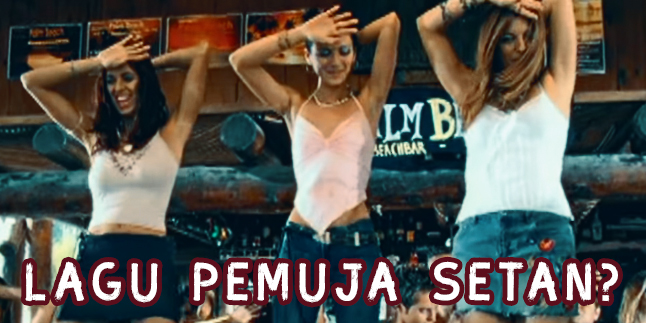Former Child Idol Cakka Nuraga Now, More Religious and Already a Uncle
Still remember Cakka Nuraga? Let's see how he is now!

Kapanlagi.com - Back in 2002, the music industry was shaken by the emergence of a song titled Asereje performed by a Spanish girl group, Las Ketchup. The song was super catchy, and its music video was also iconic because of the cool dance moves by the members.
The physical CD of Asereje sold 7 million copies worldwide. Even after several years, the song still lingers in the ears of music lovers and is often sung again.
But did you know that there is also a shocking fact amidst the Asereje craze back then? Yes, some people accused Asereje of being a devil worship song. What?!
To prove its truth, let's dissect the lyrics together..

Asereje is written in Spanish. It is undeniable that many people simply enjoy the rhythm of the song and its dance moves without knowing the true meaning of the song.
Asereje in Indonesian means Soy Sauce Song. However, the lyrics have nothing to do with food at all.
If broken down in Spanish, the word Asereje becomes A (for), Ser (to be), hereje (heretic). From there, the suspicion arises that this song does indeed have hidden dark and gloomy meanings. So what about the lyrics?
Mira lo que se avecina
A la vuelta de la esquina
Viene Diego rumbeando.
Con la luna en las pupilas
Y su traje agua marina
Parece de contrabando
The above lyrics are the chorus of Asereje. If translated literally into Indonesian, it means..
Friday night is party time
Ready to dress up
Viene Diego rumbeando
With magic in his eyes
Checking out all the girls around
Dancing as if doing the mambo
If you pay attention, there is the name Diego there. This song does tell the story of a man named Diego who comes to the club and sings along to the song played by the DJ.
Controversially, in the southern United States and Spanish-speaking countries, the name Diego is a code name for Devil or demon. Meanwhile, Friday night is a sacred day for demons in Europe and America.
But of course, all of that could just be a coincidence. So what about the chorus?

Credit Image: Youtube
Aserejè ja de jè de jebe tu de jebere seibiunouva,
Majavi an de bugui an de buididipi,
Aserejè ja de jè de jebe tu de jebere seibiunouva,
Majavi an de bugui an de buididipi
Asereje or Asejere in Spanish is pronounced as un ser hereje which means 'a heretic creature'. Meanwhile, dejebe tu dejebe can be interpreted as 'leave your body'. If combined, the overall meaning is 'The heretic creature has left your body'.
Meanwhile, some lyrics from another chorus like No es cosa de brujería que lo encuentre to' los días (pecando) por donde voy caminando can be translated as 'It's not a matter of witchcraft that I find him every day (sinning) wherever I go walking'. This sentence is then associated again with the figure of Diego who is said to have a charm that can hypnotize everyone.

Credit: Instagram/lasketchup_official
The rumors about this gossip were so widespread that they became a topic of public discussion at that time. Even Las Ketchup themselves heard about it. And at that time, the Munoz sisters firmly clarified that the song Asereje had nothing to do with the devil or mystical things, but it was just nonsense lyrics.
Whatever the controversy, the song Asereje still became a hit because it was very catchy. Even the music video was so cool to watch, where the Munoz sisters showed off their cool Latin dance moves.
(kpl/gtr)
Cobain For You Page (FYP) Yang kamu suka ada di sini,
lihat isinya
Still remember Cakka Nuraga? Let's see how he is now!
Nia Ramadhani is known to be unable to peel rambutan fruit, not only rambutan, Nia cannot peel any fruit at all.
Their one-hit wonder song, Asereje, was once referred to as a devil worship song.
Una Maulina, a beautiful woman from Aceh who is rumored to be close to Sahrul Gunawan.
Mayangsari is more self-aware if she wants to return to the entertainment world.
A list of beautiful actresses who have appeared in Warkop DKI films, who are they? Let's find out their current news.
Polwan Eka Frestya was once a hot topic among netizens because of her beauty a few years ago. What does she look like now?
There is something different about Angelica Simperler's appearance this time. When met at an event, her hair caught attention because she wore a silver wig.
Dorce also has an agency in America, where artists from Uncle Sam's Country sing dangdut songs.
A series of photos of Eky AFI finalist from the third season who still looks beautiful and ageless, curious? Let's check it out.
Back then, Adi was known to have a slim body.
A lineup of celebrities who used to be cute, now have muscular and athletic bodies, who are they? Let's take a look.